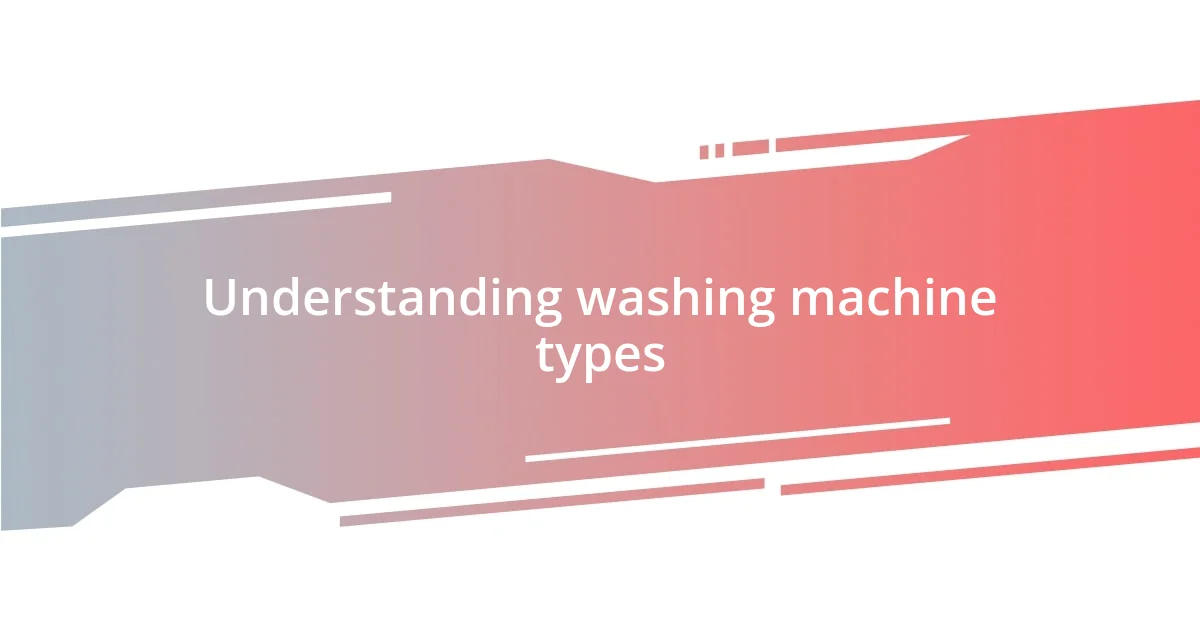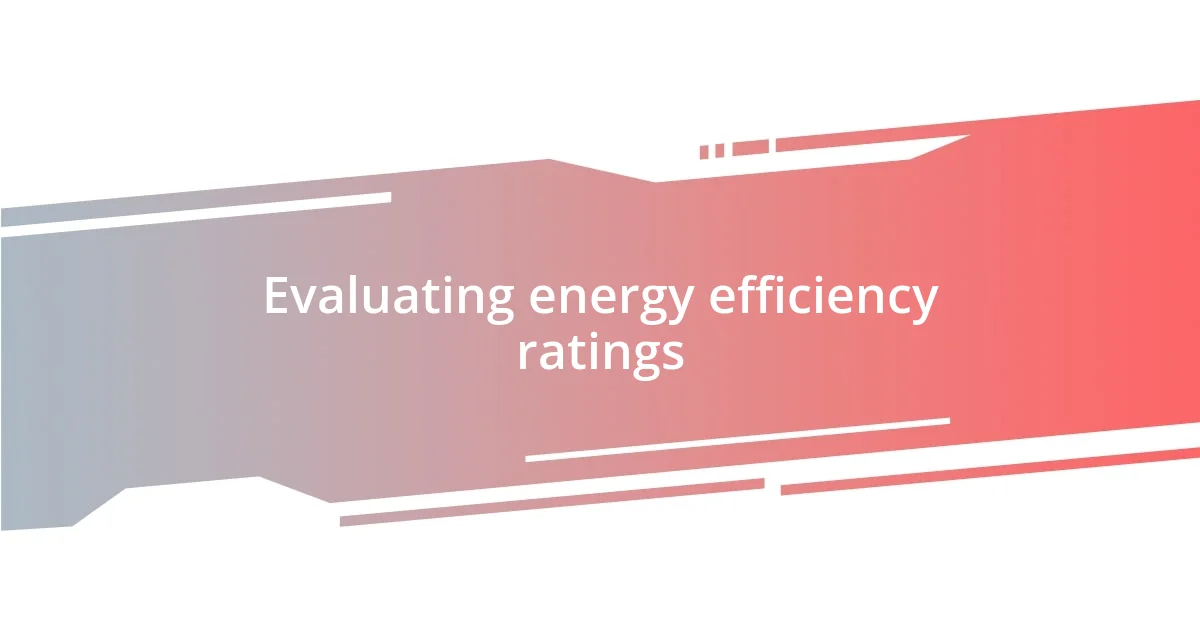Key takeaways:
- Understand the differences between top-loaders and front-loaders to select the best type based on lifestyle and efficiency needs.
- Evaluate energy efficiency ratings to make informed choices that save money and promote sustainability; higher upfront costs can lead to long-term savings.
- Research reliable brands and read customer reviews to gain insights into performance and customer service, ensuring a satisfying purchase experience.

Understanding washing machine types
When I first dove into the world of washing machines, I was surprised by the variety available. There are mainly two types: top-loaders and front-loaders. Each has unique features that cater to different needs—do you prefer a more traditional style, or are you drawn to high-efficiency models?
I remember my frustrating search for the perfect machine; I stood in the appliance aisle, surrounded by options. I had always used a top-loader, but I was curious about front-loaders. What sold me was learning how front-loaders often use less water and energy, not to mention their spin cycle’s ability to extract more moisture, which means less drying time. Isn’t it exciting to think about how a washing machine could impact your laundry routine?
As I considered my family’s needs, I found myself asking which type would really suit us best. If you’ve got a busy lifestyle, the convenience of a top-loader might be really appealing. However, if you’re aiming to save on bills and have the space for a front-loader, it could be a savvy choice. My decision ultimately came down to a mix of practicality and my desire to be eco-friendly; sometimes, that balance can be tricky to find. What will your priorities be?

Evaluating energy efficiency ratings
Evaluating energy efficiency ratings can feel overwhelming at first glance, but once I learned to decode them, it became much simpler. Each washing machine comes with an energy label, often featuring a scale that ranks efficiency from A+++ (highly efficient) to D (less efficient). Understanding these ratings helped me realize that investing in an A-rated model, while it might have a higher upfront cost, would save money in the long run through lower energy bills.
I vividly remember comparing two machines—the one that was more affordable initially and another with a higher efficiency rating. I had a moment of hesitation when considering whether to splurge. After running the numbers, I found out that the more efficient machine would save not just energy but also water. It was like a light bulb went off! I felt more confident knowing that my choice would be kinder to both my wallet and the environment.
With this knowledge in mind, I began to appreciate the crucial role energy efficiency plays in sustainability. The choices we make at home really do add up, and every load of laundry can contribute to a greener planet if we choose wisely. How do you feel about the balance between upfront costs and long-term savings in the appliances you choose?
| Washing Machine | Energy Efficiency Rating |
|---|---|
| Model A | A+++ (Highly Efficient) |
| Model B | C (Moderately Efficient) |

Comparing costs and budgets
When it came to comparing costs, I certainly felt the pressure. My first instinct was to go for the budget-friendly option, but then reality hit—I had to think about how much I’d really be spending in the long run. I remember standing with my calculator in hand, checking the price tags, and weighing the benefits of each choice. Spending a little more upfront for a more reliable machine seemed worth it when I considered the possible repair costs for cheaper models down the line.
Here’s a simple breakdown of what I learned about costs:
- Initial Cost: This includes the price of the machine itself, which can range widely from $300 to over $1,500 depending on the features.
- Operational Costs: Factor in energy and water usage, which can add to your monthly bills.
- Maintenance and Repair: Look into warranties; some models come with extended warranties for added peace of mind.
- Resale Value: Some brands retain value better than others, making them a smart investment.
I still recall feeling torn as I analyzed brands and their prices. The research felt like untangling a web of options, but once I aligned my budget with my family’s needs, it became clearer. I learned that planning for costs beyond the sticker price ultimately leads to better decisions. Budgeting is not just about the immediate expense; it’s also about balancing features with long-term value. How do you approach budgeting when shopping for big-ticket items?

Identifying key features to consider
When I set out to choose a washing machine, the features often felt endless. One that stood out to me was load capacity; it seems like a simple detail, but it makes a huge difference in daily life. I remember the days of cramming clothes into a smaller machine, wishing I could just wash everything in one go. Imagine how convenient it would be to do fewer loads and have more time for other things!
Another critical feature I considered was wash programs. Different fabrics and stains require specific settings, and I learned that a good machine can cater to all these needs. For example, I recently lent a friend my washing machine during a family visit and she loved the delicate cycle for her favorite silk blouse. It’s moments like these that remind me how important it is to choose a machine that adapts to our varying laundry needs. Do you think about how often you’ll use certain features before making a decision?
Lastly, I couldn’t overlook the importance of noise level. The first time I ran a cycle in a newly bought machine, I was pleasantly surprised at how quiet it was compared to my old one. There’s something serene about being able to do laundry even during quiet evenings at home. It’s a feature many buyers may overlook, but trust me, if you have a laundry area near your living space, the noise factor truly matters. Have you ever found yourself startled by a loud washing machine in the middle of the night?

Researching reliable brands and models
Researching reliable brands was another pivotal moment in my washing machine journey. I started by diving into online reviews and consumer reports, which is like peering into the minds of other users. One brand caught my attention due to consistently positive feedback on both performance and longevity. It reminded me of a friend’s experience; she swore by her Samsung, stating that it had never let her down, even after years of frequent use. Can you imagine the peace of mind that comes from knowing your appliance holds up well over time?
To further refine my choices, I drew comparisons among models within the brands I trusted. I remember visiting local appliance stores and physically examining the machines, feeling their build quality. Models with metal casings felt sturdier in my hands than flimsy plastic ones, which instantly shaped my perception of reliability. Discovering that one model had a reputation for a lesser breakdown rate was a significant turning point—it’s like finding a gem in a sea of options. Have you ever felt more assured by the solid feel of a product while shopping?
Looking back, it was equally important for me to consider the brand’s customer service reputation. A washing machine, like any other appliance, may require service or repairs eventually—and having a solid support system is crucial. I found myself reading about people’s experiences with warranties and service calls, which I realized could reveal as much about a brand as its products do. One user shared how a quick response from LG transformed a stressful situation into a seamless fix, reaffirming my choice as I narrowed down my options. When was the last time reliable customer service made a difference for you in a purchase?

Reading customer reviews and experiences
Reading through customer reviews felt like a treasure hunt—each one brimming with insights that helped shape my decision. I’ll never forget a comment I came across about a washing machine’s energy efficiency. The user mentioned saving on their utility bills while consistently producing fresh, clean clothes. That personal anecdote really resonated with me. I began to picture not just the functionality of the machine, but how it could lighten my financial load over time. Have you ever considered how much energy savings could impact your household budget?
As I immersed myself in customer experiences, I found a recurring theme: how important reliability is after purchase. I read a review from a mother who shared a story about a spontaneous camping trip. Her machine handled multiple loads with a smile, even when the kids’ clothes were caked in mud. This made me reflect on my own lifestyle. Could my washer keep up with my family’s busy routine, or would it be an obstacle? I often think that knowing how a product performs in real-life situations can be just as valuable as the technical specifications.
Some reviews even touched on the emotional aspects of doing laundry. I remember one user vividly describing the comfort of using a machine that didn’t just clean but also felt like part of their home. They spoke of Sunday evening rituals, where the gentle hum of the machine brought a sense of calm after a busy week. That story struck a chord with me. Does a simple appliance evoke nostalgia and create rituals in your life, too? The more I explored, the more I realized that washing machines aren’t just about functionality; they become integral to our daily lives.















